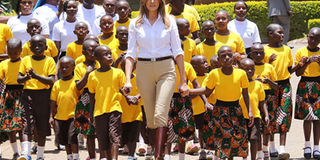Children homes in crisis as Covid-19 dries up donations

US First Lady Melania Trump visits Nest Children’s Home in Kiambu on October 5, 2018. PHOTO | FILE | NATION MEDIA GROUP
What you need to know:
- Nest Children’s Home boss Irene Baumgartner wants tax exemption for donations to charitable institutions.
- President Kenyatta announced that Sh10 billion had been appropriated to the elderly, orphans and other vulnerable members of the society.
Children homes across the country have been thrown into a crisis following the lockdown over coronavirus, hindering their access to donations.
The government’s directive to shut all churches and organisations that offer non-essential services has further deemed hopes of the children’s homes and homes of the elderly, which majorly rely on well-wishers and faith-based institutions to operate.
Other vulnerable members of the society, including street families and those living in slums, are also facing uncertain times with their inability to effectively self-isolate, buy protective gears, afford flowing water to wash their hands and other basic directives given by experts as the major ways to contain Covid-19 spread.
The respiratory disease, which broke out thousands of miles away in Wuhan province in China late last year, has had devastating effects not only on innocent infants at Nest Children’s Home in Kiambu but also their orphaned counterparts in Davilla home in Bomet County, Motherly Care home in Nairobi and beyond.
Unlike schools that have had to close indefinitely, the homes are a lifeline to the destitute who have nowhere to live.
FOOD INSECURITY
Ms Irene Baumgartner, the director of Nest, which cares for 120 children, most of whose mothers are in jail, called on President Uhuru Kenyatta to consider creating a tax exemption for donations to charitable institutions.
“This is the only programme in the country that caters for children of imprisoned mothers, so we cannot afford to close down. The children have neither homes nor guardians,” she said.
Ms Baumgartner had stockpiled food and non-food items after reports indicated that the locust invasion would result in food shortages. The stocks may, however, run out with the persisting pandemic.
“We have tried to use what we have but we don’t know for how long it will take; we need to prepare for the long-term, but we also need funds to put those detailed measures in place,” said Ms Baumgartner.
“We rely on donors from Europe and if businesses are destroyed by coronavirus effects, the donors will be in need themselves. And I am afraid they will no longer come through for us,” Ms Baumgartner added.
The predicament is not any better at Motherly Care and Davilla Homes, where in a bid to ensure safety of children, they have banned all visitors, majority of whom ordinarily would donate foods, clothing, bedding, educational materials and even spend time with the children.
SOCIAL-DISTANCING
Ms Patricia Chumo, an accountant at Motherly Care, said they have had to change their lifestyles from a welcoming and interactive lot to one that keeps washing hands with minimised play to reduce contact.
“We have locked up the gate and do not allow any visitors. None of the staff leaves the compound either. This lockdown means we are losing in a big way; many have cancelled their visits and donations too,” said Ms Chumo.
The facility is home to 64 children, ranging from babies to high schoolers. They are under the care of 12 staffers who have also had to board.
“We are trying to make the children stay apart, so we don’t encourage so much playing as before. But that is hard; they don’t understand why they shouldn’t touch each other as always,” she explained.
Dr David Langat of Davilla Home said the institution is running short of food, particularly rice and maize, because donations from churches have run dry.
“Davilla does not have direct funders and relies on churches for donations. With the worship centres closed and everyone beginning to plan for the safety of their own families, we are left in dire need,” said the proprietor.
STREET FAMILIES
President Kenyatta on Wednesday announced that Sh10 billion had been appropriated to the elderly, orphans and other vulnerable members of the society through cash transfers by the Ministry of Labour.
The homes, however, said they were yet to be contacted by the ministry on whether some money would be sent to them.
“No one has mentioned anything to the effect of receiving some funds from the government,” said Mr Langat.
Equally hit are 42,000 street children, who are supposed to maintain hygiene and keep social-distancing.
Most street dwellers in the city centre, however, said the curfew is much better than a total lockdown that would have led them to starvation, considering that their meals are made up of leftovers from busy hotels and from passers-by.





